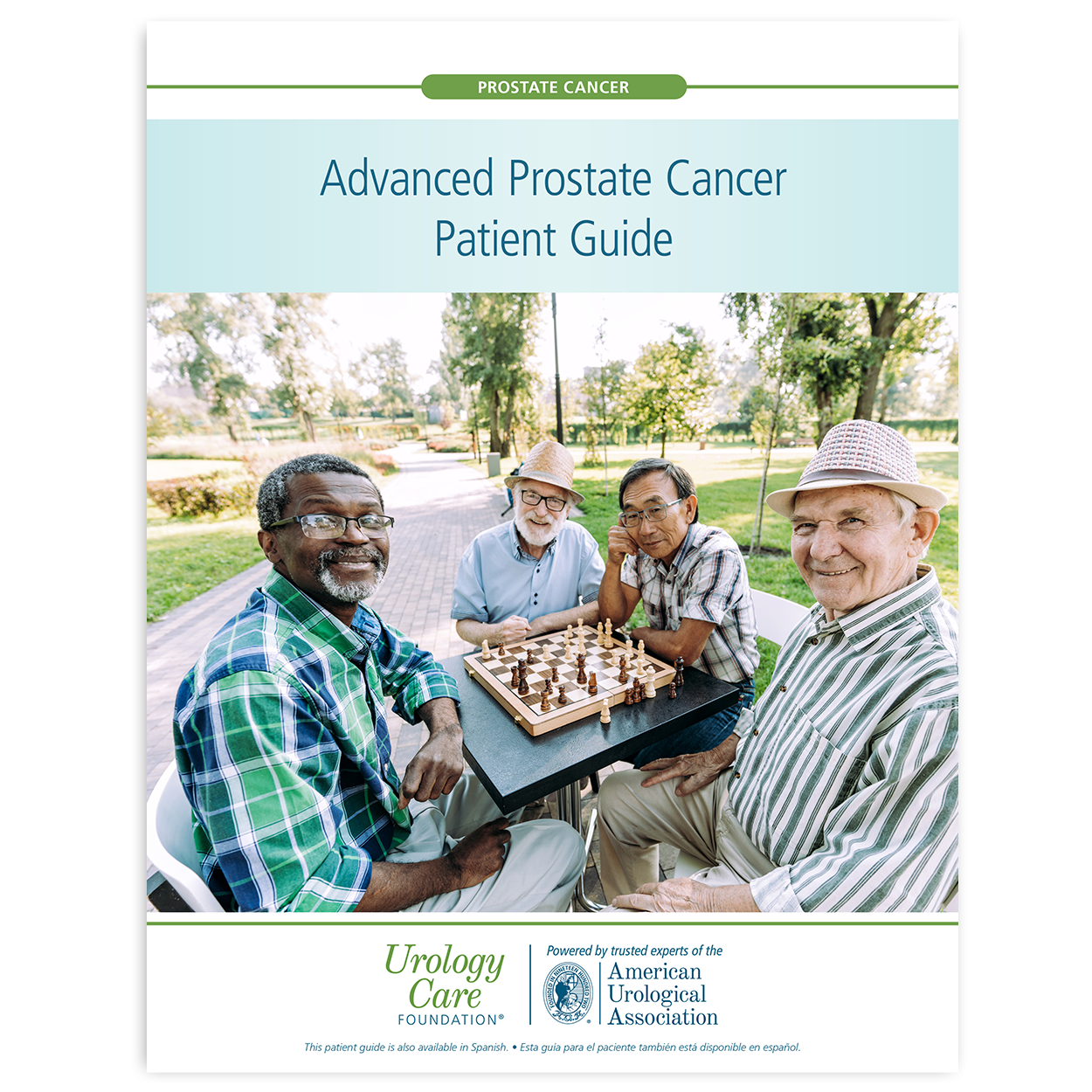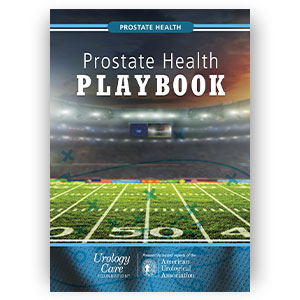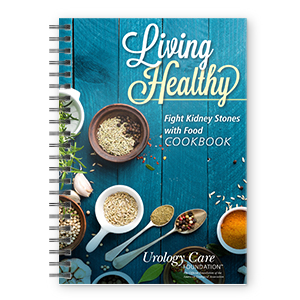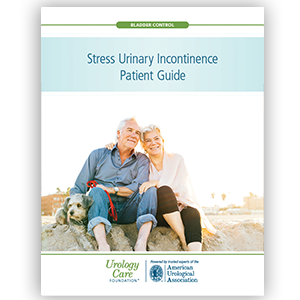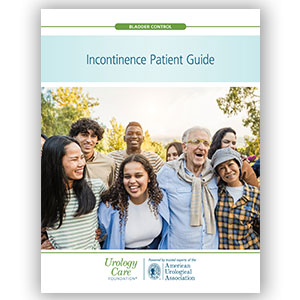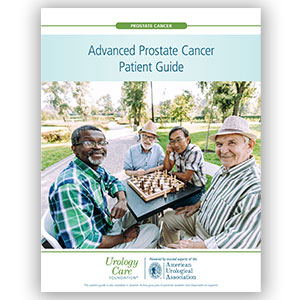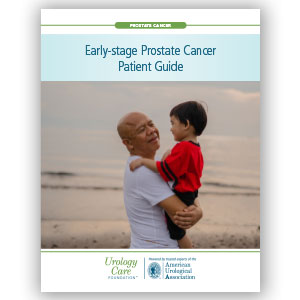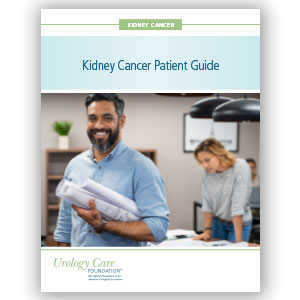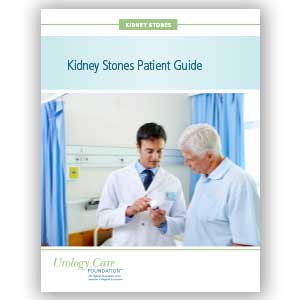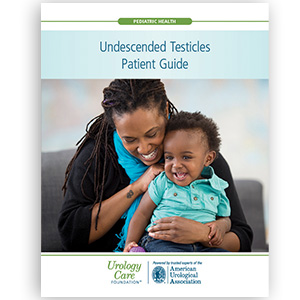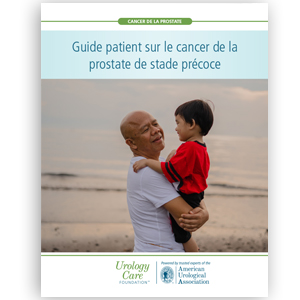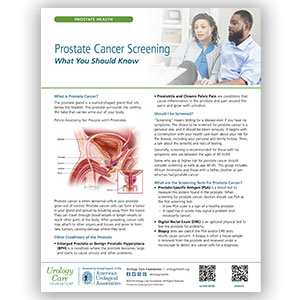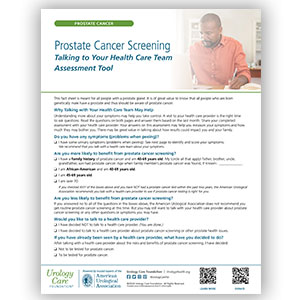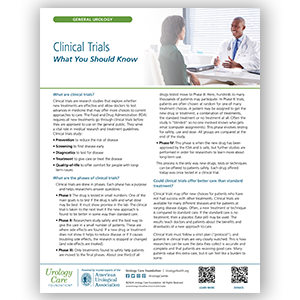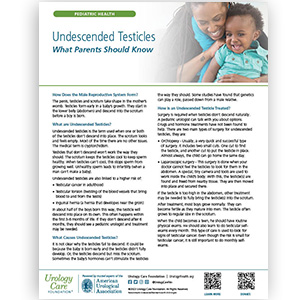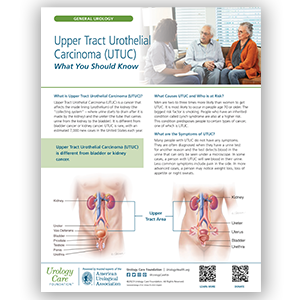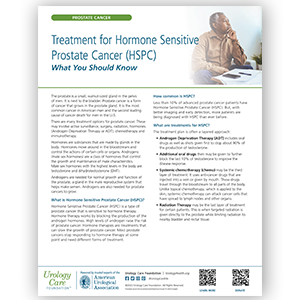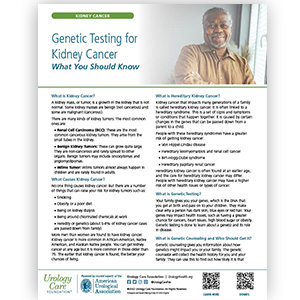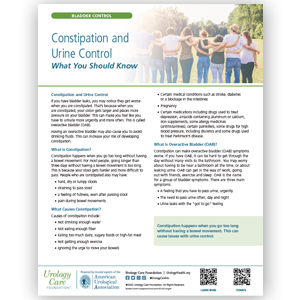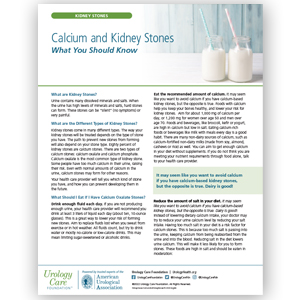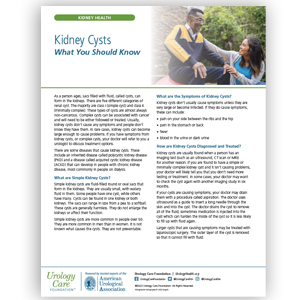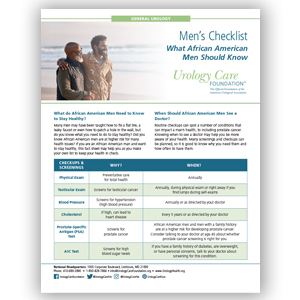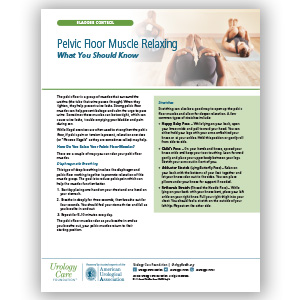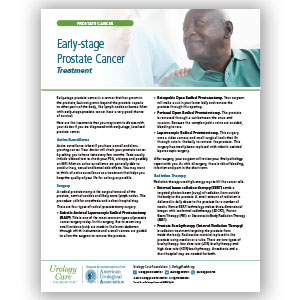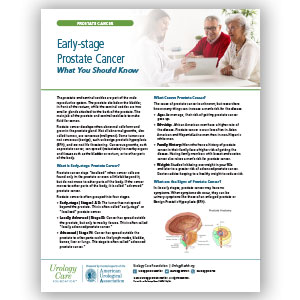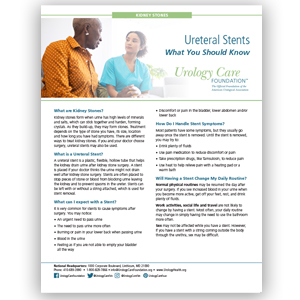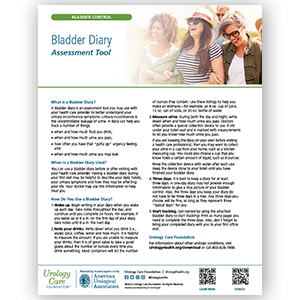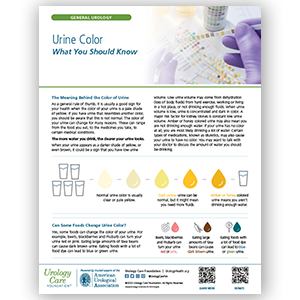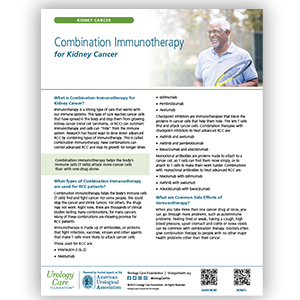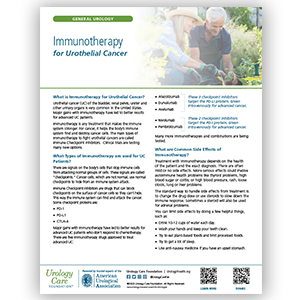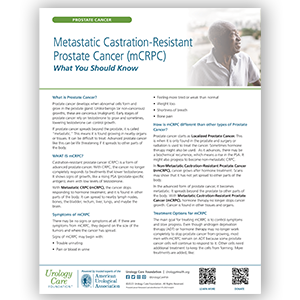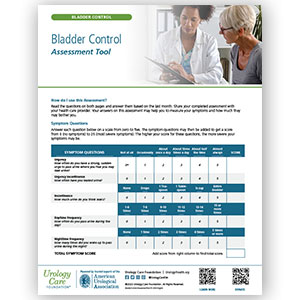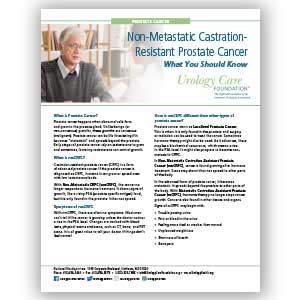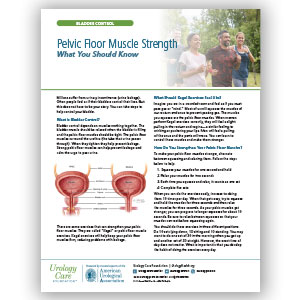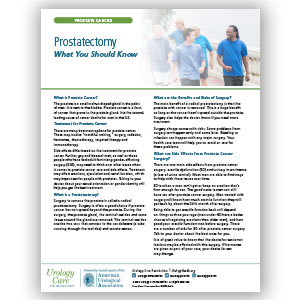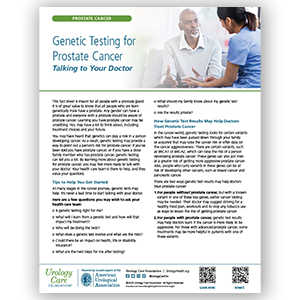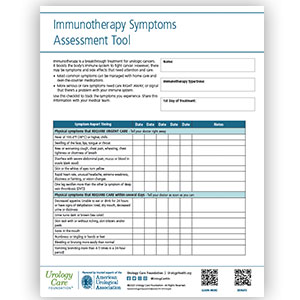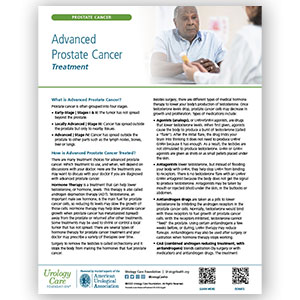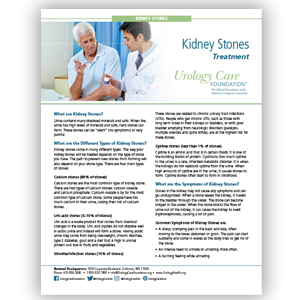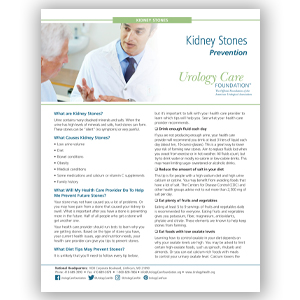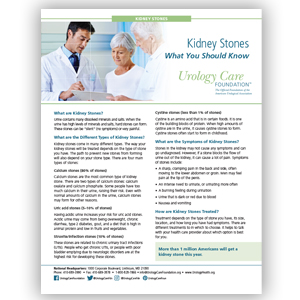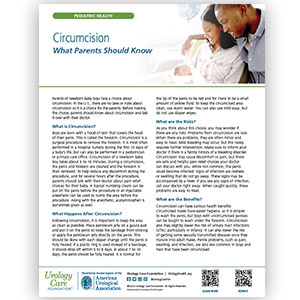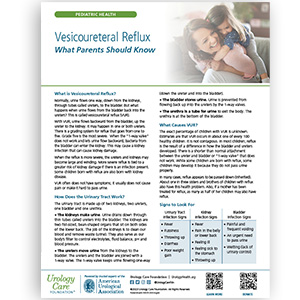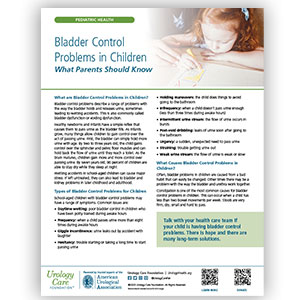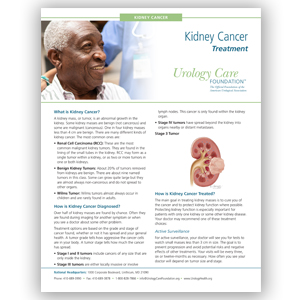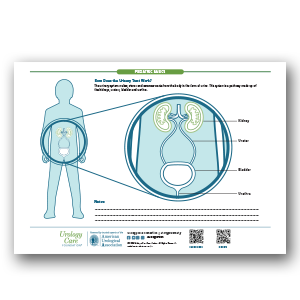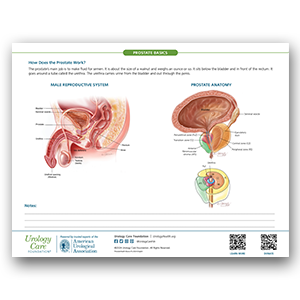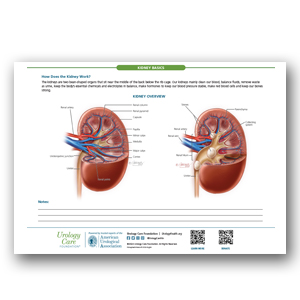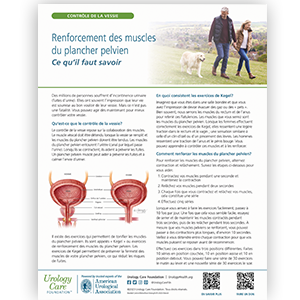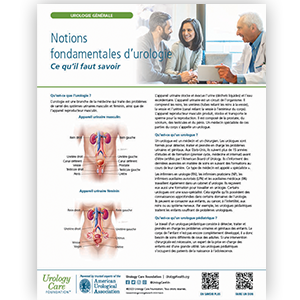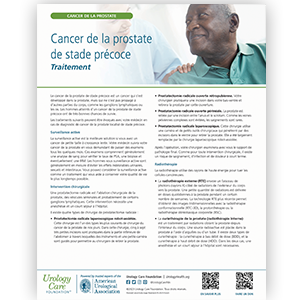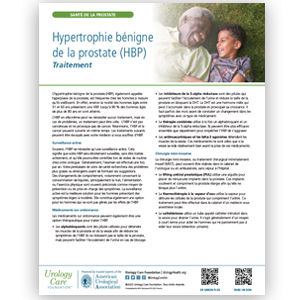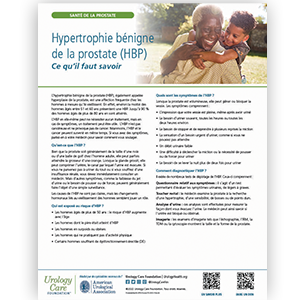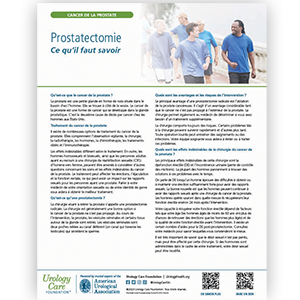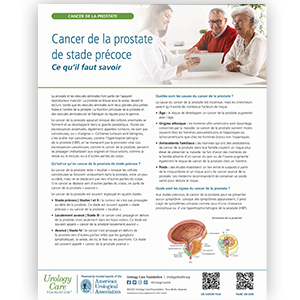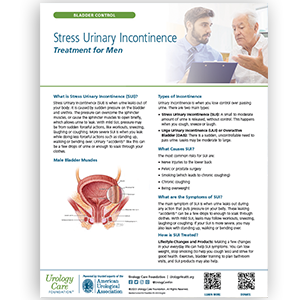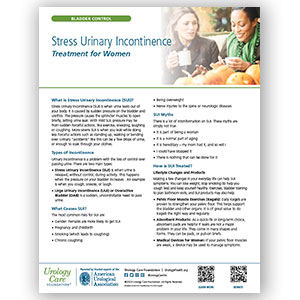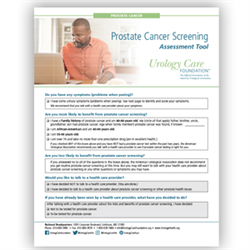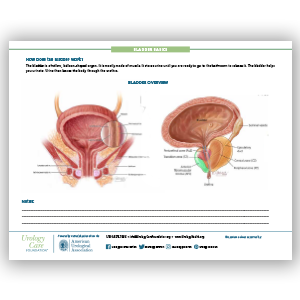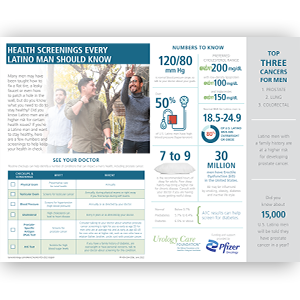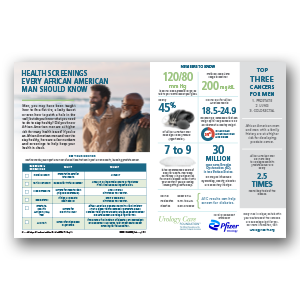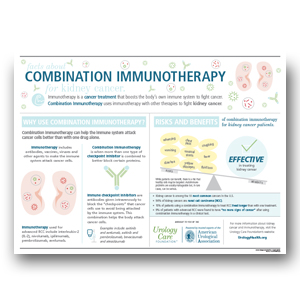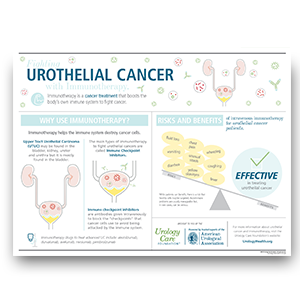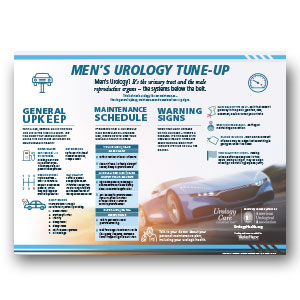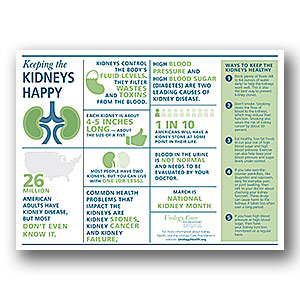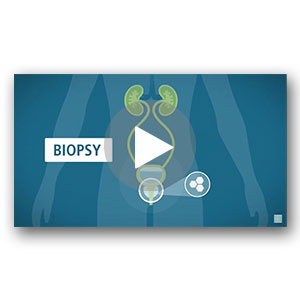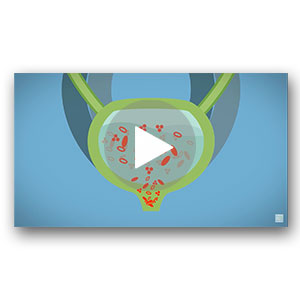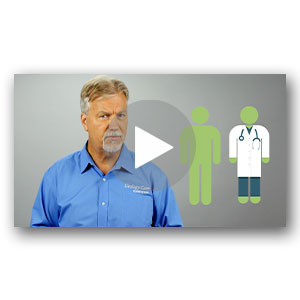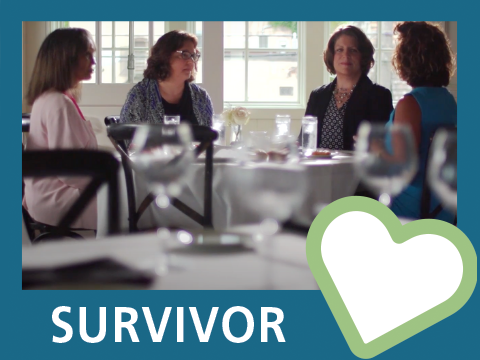Advanced Prostate Cancer
Order available (US ONLY). In this patient guide, patients are provided with information about advanced prostate cancer to help during their prostate cancer journey. Content includes how to diagnose, screen, treat and manage advanced prostate cancer, including a patient perspective.… more
Prostate Health Playbook
Order this football-themed prostate health resource covering prostatitis, BPH, incontinence as well as information on prostate cancer to include screening and treatment options.… more
Living Healthy Cookbook with Information about Urologic Cancers
Part of managing cancer includes a healthy diet and lifestyle. This educational cookbook has recipes from celebrity chefs and is designed to help those affected by urologic cancers.… more
Living Healthy Cookbook with Information about Urologic Cancers
Part of managing cancer includes a healthy diet and lifestyle. This educational cookbook has recipes from celebrity chefs and is designed to help those affected by urologic cancers.… more
Living Healthy: Fight Kidney Stones with Food Cookbook
An educational recipe book designed to help prevent kidney stones with nutrition and diet.… more
Stress Urinary Incontinence (SUI)
Download this patient resource on Stress Urinary Incontinence (SUI).… more
Early-stage Prostate Cancer
How to diagnose, screen, treat and manage early-stage prostate cancer, including a patient perspective.… more
Guide patient sur la cystite interstitielle (syndrome de la vessie douloureuse)
La cystite interstitielle (CI), ou syndrome de la vessie douloureuse (SVD), est un problème de douleur vésicale chronique. Cela peut évoquer une infection de la vessie ou infection urinaire, mais ce n’en est pas une. Il s’agit d’une sensation d’inconfort et de pression dans la région de la vessie qui dure six semaines ou plus, sans infection ni autre cause évidente. (Patient Guide to Interstitial Cystitis (Painful Bladder Syndrome))… more
Guide patient sur le cancer de la prostate de stade précoce
Le cancer de la prostate est la deuxième cause de décès par cancer chez les hommes aux États-Unis. La plupart des hommes ayant un diagnostic précoce peuvent vivre longtemps. Choisir son traitement peut être difficile. Informez-vous et posez des questions afin de faire le choix qui vous conviendra le mieux. (Early-stage Prostate Cancer Patient Guide)… more
Hướng dẫn dành cho bệnh nhân sỏi thận
Tài liệu này hướng dẫn cách chẩn đoán và điều trị sỏi, cũng như giải thích cách phòng ngừa bằng chế độ ăn uống vàthuốc. (Kidney Stones Patient Guide)… more
Hướng dẫn dành cho bệnh nhân ung thư thận
Hướng dẫn này sẽ cho bạn biết về ung thư thận và các bước tiếp theo mà bạn có thể thực hiện nếu một khối u hình thành trong cơ thể của bạn. (Kidney Cancer Patient Guide)… more
Hướng dẫn dành cho bệnh nhân ung thư tuyến tiền liệt giai đoạn tiến triển
Khi ung thư xâm lấn ra ngoài tuyến tiền liệt hoặc tái phát sau khi điều trị sẽ được gọi là ung thư tuyến tiền liệt giai đoạn tiến triển. Hiểu được bản chất của bệnh, làm sang tỏ các thắc mắc có thể giúp bạn đưa ra lựa chọn phù hợp. (Advanced Prostate Cancer Patient Guide)… more
Hướng dẫn cho bệnh nhân ung thư tuyến tiền liệt giai đoạn sớm
Ung thư tuyến tiền liệt phát triển khi các tế bào bất thường hình thành và phát triển trong tuyến tiền liệt. Hiểu được bản chất của bệnh, làm sang tỏ các thắc mắc có thể giúp bạn đưa ra lựa chọn phù hợp. (Early-stage Prostate Cancer Patient Guide)… more
UrologyHealth extra® – Navigating Prostate Cancer
Download this special issue focusing on prostate cancer that includes information for patients and caregivers on risk factors, healthy living tips and more.… more
UrologyHealth extra – Navigating Prostate Cancer
Order this special issue focusing on prostate cancer that includes information for patients and caregivers on risk factors, healthy living tips and more.… more
Advanced Prostate Cancer – What You Should Know Fact Sheet
Order a review of advanced prostate cancer to include its stages and risk factors.… more
Prostate Cancer Screening What You Should Know
Order this patient-friendly prostate cancer screening fact sheet to be shipped free in the United States. This fact sheet is used to aid in decision making about prostate cancer screening.… more
Prostate Cancer Screening Talking to Your Health Care Team Assessment Tool
Download this free patient-friendly screening assessment tool designed to self-assess symptoms to help guide conversations with your health care team about prostate cancer screening. … more
Prostate Cancer Screening What You Should Know
Download this free patient-friendly fact sheet to aid in decision making about prostate cancer screening.… more
Clinical Trials - What You Should Know Fact Sheet
Order this fact sheet to learn about clinical trials, include details about phases, benefits, privacy rights, fees and resources to learn more.… more
Clinical Trials - What You Should Know Fact Sheet
Download this fact sheet to learn about clinical trials, include details about phases, benefits, privacy rights, fees and resources to learn more.… more
Women’s Health and Menopause – What You Should Know Fact Sheet
Learn about women’s health during perimenopause and menopause, symptoms and treatment options. … more
Women’s Health and Menopause – What You Should Know Fact Sheet
Order this fact sheet that includes information on perimenopause, menopause, symptoms and treatment options for women.… more
Men’s Checklist What Latino Men Should Know Fact Sheet
Did you know Latino men are at higher risk for many health issues? This free fact sheet includes numbers and screenings to help Latino men keep their health in check.… more
Treatment Intensification for Hormone Sensitive Prostate Cancer (HSPC) - Talking to Your Doctor Fact Sheet
Learn about treatment intensification for Hormone Sensitive Prostate Cancer and questions to ask your doctor.… more
Upper Tract Urothelial Carcinoma (UTUC) - What You Should Know
Order this fact sheet to be shipped free in the United States to learn about Upper Tract Urothelial Carcinoma (UTUC), types, symptoms, treatment and more.… more
Upper Tract Urothelial Carcinoma (UTUC) - What You Should Know
Download this fact sheet to learn about Upper Tract Urothelial Carcinoma (UTUC), types, symptoms, treatment and more.… more
Treatment for Hormone Sensitive Prostate Cancer (HSPC) - What You Should Know Fact Sheet
Learn about Hormone Sensitive Prostate Cancer, common treatments and what to expect after treatment.… more
Genetic Testing for Kidney Cancer – What You Should Know Fact Sheet
A description about genetic testing for kidney cancer and how genetic test results may help patients make informed choices.… more
Constipation and Urine Control - What You Should Know Fact Sheet
This fact sheet outlines what to know about constipation and urine control. Constipation happens when you go too long without having a bowel movement & this can cause issues with urine control. … more
Constipation and Urine Control: What You Should Know
Order this fact sheet that outlines what to know about constipation and urine control. Constipation happens when you go too long without having a bowel movement & this can cause issues with urine control. … more
Ureteropelvic Junction (UPJ) Obstruction - What Parents Should Know Fact Sheet
Learn about Ureteropelvic Junction (UPJ) Obstruction, its causes, symptoms and common treatments.… more
Androgen Deprivation Therapy (ADT) - Talking to Your Doctor Fact Sheet
Learn about how to talk to your doctor Androgen Deprivation Therapy (ADT) for prostate cancer.… more
Androgen Deprivation Therapy (ADT) – What You Should Know Fact Sheet
Learn about Androgen Deprivation Therapy (ADT) for prostate cancer, who should receive ADT, how is ADT given and the benefits, risks and side effects of ADT. … more
Calcium and Kidney Stones - What You Should Know Fact Sheet
There are two types of calcium stones: calcium oxalate and calcium phosphate. This fact sheet outlines what you should know about calcium and kidney stones.… more
Kidney Cysts - What You Should Know Fact Sheet
As a person ages, sacs filled with fluid, called cysts, can form in the kidneys. This fact sheet outlines what you should know about kidney cysts.… more
Bladder Exstrophy – What Parents Should Know Fact Sheet
Bladder exstrophy is a rare birth defect. On average, it occurs in about 1 out of every 50,000 live births. It is slightly more common in males than females. It is a condition where the bladder and parts around it form inside-out. … more
Women’s Urology – What You Should Know Fact Sheet
Women often put the health of their families ahead of their own. It is of great value to take care of your own health, including your urologic health. There are many things you can do to prevent urologic conditions such as kidney stones and urinary tract infections (UTIs). Here are some healthy living tips that can improve your urologic health.… more
Men’s Checklist What African American Men Should Know
Did you know African American men are at higher risk for many health issues? This free fact sheet includes numbers and screenings to help African American men keep their health in check. … more
Salvage Radiation Therapy for Prostate Cancer
Learn about salvage radiation therapy (SRT) as a type of cancer treatment given to men who had their prostate removed yet their prostate-specific antigen (PSA) levels begin to rise.… more
Genomic Diagnostic Testing for Prostate Cancer
Learn about genomic testing and how it may impact prostate cancer.… more
Pelvic Floor Muscle Relaxing: What You Should Know
Strong pelvic floor muscles can help prevent leakage and calm the urge to pass urine. Sometimes these muscles can be too tight, which can cause urine leaks, trouble emptying your bladder and pain during sex.… more
Advanced Prostate Cancer – What You Should Know
A review of advanced prostate cancer to include its stages and risk factors.… more
Treatment for Early-Stage Prostate Cancer
This fact sheet covers the treatments you may want to discuss with your doctor if you are diagnosed with early-stage, localized prostate cancer.… more
Early-Stage Prostate Cancer: What You Should Know
Learn more about Early-Stage Prostate Cancer using this fact sheet.… more
Ureteral Stents What You Should Know
A ureteral stent is a plastic, flexible tube that helps the kidney drain urine after kidney stone surgery. Learn about how they feel, how they are removed and when to call a doctor if you feel concerned. … more
Bladder Diary Assessment Tool
Use this bladder diary assessment tool and share the results with your healthcare provider to get a better understanding of your urinary incontinence symptoms. … more
Bladder Diary Assessment Tool
Use this bladder diary assessment tool and share the results with your healthcare provider to get a better understanding of your urinary incontinence symptoms. … more
Bladder Prolapse - What You Should Know
An overview of bladder prolapse causes, symptoms, diagnosis and treatment options.… more
Urine Color - What You Should Know
A fact sheet about the meaning behind the color of urine for people of all ages to know when to drink more, what can change urine color and when to talk with a doctor about urine color.… more
Metastatic Hormone-Sensitive Prostate Cancer (mHSPC) - What You Should Know Fact Sheet
A concise summary about Metastatic Hormone-Sensitive Prostate Cancer to help patients understand this stage, to include treatment.… more
Telehealth - What You Should Know
A fact sheet on what patients should know about telehealth.… more
Combination Immunotherapy for Kidney Cancer Fact Sheet
Summary of combination immunotherapy for renal cell carcinoma including treatment, adverse reactions and questions to ask the health care team.… more
Immunotherapy for Urothelial Cancer Fact Sheet
Summary of immunotherapy for cancers of the bladder, renal pelvis, ureter and other urinary organs to include treatment, adverse reactions and questions to ask the health care team.… more
Hypospadias – What Parents Should Know
A short summary of Hypospadias, including signs, diagnosis, treatments and questions to ask your child’s doctor.… more
Varicoceles - What You Should Know
Designed for teen boys and men to explain this condition, causes, treatments and address frequently asked questions.… more
Metastatic Castration-Resistant Prostate Cancer (mCRPC) - What You Should Know Fact Sheet
A concise summary of Metastatic Castration –Resistant Prostate Cancer to help patients understand this stage of prostate cancer.… more
Bedwetting in Children: What Parents Should Know Fact Sheet
Download this fact sheet.… more
Bladder Control Assessment Tool
This Bladder Control assessment tool may help to measure symptoms and quality of life related to passing urine.… more
Non-Metastatic Castration-Resistant Prostate Cancer (nmCRPC) – What You Should Know
A concise summary of Non-metastatic Castration–Resistant Prostate Cancer to help patients understand this stage of prostate cancer.… more
Pelvic Floor Muscle Strength: What You Should Know
Download this fact sheet on how to perform Kegel exercises.… more
Overactive Bladder Assessment Tool
An assessment tool that allows patient to score symptoms and illustrates how they may be affecting their quality of life.… more
Overactive Bladder Diary
This Overactive Bladder Diary may help to record liquid intake, how often urine is passed and urine leakage to help you talk with your health care team.… more
Bladder Control Assessment Tool
This Bladder Control assessment tool may help to measure symptoms and quality of life related to passing urine. … more
Prostatectomy – What You Should Know Fact Sheet
A review of prostatectomy for prostate cancer treatment to include general information, benefits, risks and side effects. … more
Women’s Checklist What Black Women Should Know
Did you know Black women are at higher risk for many health issues? This free fact sheet includes numbers and screenings to help Black women keep their health in check. … more
Men with a Higher Risk for Prostate Cancer – What You Should Know
Learn about which men may have a higher risk for prostate cancer as well as about screening and treatment. … more
Genetic Testing for Prostate Cancer - What You Should Know
Learn about genetic testing and how it may impact prostate cancer.… more
Genetic Testing for Prostate Cancer – Talking to Your Doctor
At many stages in the cancer journey, genetic tests may help. This fact sheet may help prepare those impacted by prostate cancer to talk to the health care team.… more
Advanced Prostate Cancer Treatment
A review of advanced prostate cancer to include its stages and treatment options.… more
Neurogenic Bladder - What You Should Know Fact Sheet
A fact sheet that helps patients to understand when nerve damage causes bladder problems and how to manage the condition.… more
Pediatric Urology Basics
The basics about urinary function in children with notes section to help patients, parents and health care teams.… more
Prostate Basics
The basics about prostate function and prostate cancer with notes section to help patients and health care teams.… more
Kidney Basics
The basics about kidney function, kidney stones and kidney cancer with notes section to help patients and health care teams.… more
L’énurésie chez l’enfant: Ce que les parents doivent savoir
Il est question d’énurésie nocturne lorsqu’un enfant urine involontairement pendant son sommeil. C’est ce qu’on appelle communément faire pipi au lit. Plus de cinq millions d’enfants aux États-Unis ont des problèmes d’énurésie. (Bedwetting – What Parents Should Know Fact Sheet)… more
Détente des muscles du plancher pelvien: Ce qu’il faut savoir
Un plancher pelvien musclé peut aider à prévenir les fuites et à calmer l’envie d’uriner. Parfois, ces muscles peuvent être trop tendus, ce qui peut entraîner des fuites urinaires, des difficultés à vider la vessie et des douleurs pendant les rapports sexuels. (Pelvic Floor Muscle Relaxing – What You Should Know Fact Sheet)… more
Renforcement des muscles du plancher pelvien: Ce qu’il faut savoir
Des millions de personnes souffrent d’incontinence urinaire (fuites d’urine). Elles ont souvent l’impression que leur vie est soumise au bon vouloir de leur vessie. Mais ce n’est pas une fatalité. Vous pouvez agir dès maintenant pour mieux contrôler votre vessie. (Pelvic Floor Muscle Strength – What You Should Know Fact Sheet)… more
Tests génétiques pour le cancer du rein: Ce qu’il faut savoir
Une masse rénale, ou tumeur, est une excroissance anormale dans le rein. Certaines masses rénales sont bénignes (non cancéreuses) et d’autres sont malignes (cancéreuses). (Genetic Testing for Kidney Cancer - What You Should Know Fact Sheet)… more
Calcium et calculs rénaux: Ce qu’il faut savoir
L’urine contient de nombreux minéraux et sels dissous. Lorsque l’urine contient des niveaux élevés de minéraux et de sels, des cristaux solides appelés calculs peuvent se former. Ces calculs peuvent être « silencieux » (asymptomatiques) ou très douloureux. (Calcium and Kidney Stones – What You Should Know Fact Sheet)… more
Kystes rénaux: Ce qu’il faut savoir
Avec l’âge, des poches remplies de liquide, appelées kystes, peuvent se former dans les reins. Il existe cinq catégories de kystes rénaux. La plupart sont de classe I (kystes simples) et de classe II (kystes peu complexes). Ces types de kystes sont presque toujours non cancéreux. Les kystes complexes peuvent être associés à un cancer et devront être suivis ou traités. (Kidney Cysts – What You Should Know Fact Sheet)… more
Contrôle technique de l’urologie masculine: Ce que les hommes doivent savoir sur leur santé urologique
Pour les hommes, l’urologie englobe les voies urinaires et les organes reproducteurs masculins, c’est-à-dire les systèmes situés dans le bas ventre. La plupart des hommes connaissent les bases de l’entretien automobile, mais beaucoup d’hommes ne sont pas au fait de l’entretien urologique. Cette brochure utilise l’analogie de l’entretien automobile pour vous aider à comprendre les notions fondamentales de votre santé urologique. (Men’s Urology Tune-Up Fact Sheet)… more
Notions fondamentales d’urologie: Ce qu’il faut savoir
L’urologie est une branche de la médecine qui traite des problems de santé des systèmes urinaires masculin et féminin, ainsi que de l’appareil reproducteur masculin. (Urology Basics Fact Sheet)… more
Urologie feminine: Ce qu’il faut savoir
Les femmes font souvent passer la santé de leur famille avant la leur. Il est essentiel de prendre soin de sa propre santé, y compris de sa santé urologique. Vous pouvez faire de nombreuses choses pour prévenir les affections urologiques telles que les calculs rénaux et les infections urinaires (IU). (Women’s Urology Fact Sheet)… more
Varicocèles: Ce qu’il faut savoir
Le terme varicocèle désigne une dilatation du groupe de veines situées à l’intérieur du scrotum (le sac qui contient les testicules) en raison d’une mauvaise circulation sanguine. (Varicoceles – What You Should Know Fact Sheet)… more
Cancer de la prostate de stade précoce: Traitement
Les traitements suivants peuvent être évoqués avec votre médecin en cas de diagnostic de cancer de la prostate localisé de stade précoce. (Early-stage Prostate Cancer Treatment Fact Sheet)… more
Hypertrophie bénigne de la prostate (HBP): Traitement
L’HBP en elle-même peut ne nécessiter aucun traitement, mais en cas de problèmes, un traitement peut être utile. L’HBP n’est pas cancéreuse et ne provoque pas de cancer. Néanmoins, l’HBP et le cancer peuvent survenir en même temps. Les traitements suivants peuvent être évoqués avec votre médecin si vous souffrez d’HBP. (BPH Treatment Fact Sheet)… more
Hypertrophie bénigne de la prostate (HBP): Ce qu’il faut savoir
L’hypertrophie bénigne de la prostate (HBP), également appelée hyperplasie de la prostate, est une affection fréquente chez les hommes à mesure qu’ils vieillissent. (BPH - What You Should Know Fact Sheet)… more
Prostatectomie: Ce qu’il faut savoir
La chirurgie visant à retirer la prostate s’appelle une prostatectomie radicale. La chirurgie est généralement une bonne option si le cancer de la prostate ne s’est pas propagé. (Prostatectomy - What You Should Know Fact Sheet)… more
Cancer de la prostate de stade précoce: Ce qu’il faut savoir
Le cancer de la prostate apparait lorsque des cellules anormales se forment et se développent dans la glande prostatique. Toutes les excroissances anormales, également appelées tumeurs, ne sont pas cancéreuses, ou « malignes ». Certaines tumeurs sont bénignes, c’est-à-dire non cancéreuses, comme l’hypertrophie bénigne de la prostate (HBP), et ne menacent pas le pronostic vital. (Early-stage Prostate Cancer - What You Should Know Fact Sheet)… more
Prostate Cancer Screening Assessment Tool
Order this patient-friendly screening assessment tool to be shipped free in the United States; designed to self-assess symptoms to help guide conversations with your health care team about prostate cancer screening. … more
Bladder Basics
The basics about bladder function and bladder cancer with notes section to help patients and health care teams. … more
Health Screenings Every Latino Man Should Know Poster
Did you know Latino men are at higher risk for many health issues? This free download includes numbers and screenings to help Latino men keep their health in check.… more
Health Screenings Every Latino Man Should Know Poster
Did you know Latino men are at higher risk for many health issues? This free download includes numbers and screenings to help Latino men keep their health in check.… more
Health Screenings Every Black Woman Should Know
Did you know Black women are at higher risk for many health issues? This free poster includes numbers and screenings to help Black women keep their health in check. … more
Health Screenings Every Black Woman Should Know
Did you know Black women are at higher risk for many health issues? This free poster includes numbers and screenings to help Black women keep their health in check. … more
Health Screenings Every African American Man Should Know
Did you know African American men are at higher risk for many health issues? This free download includes numbers and screenings to help African American men keep their health in check.… more
Combination Immunotherapy for Kidney Cancer
A graphic description of combination immunotherapy for renal cell carcinoma to include risks and benefits.… more
Fighting Urothelial Cancer with Immunotherapy
A graphic description of immunotherapy for cancers of the bladder, renal pelvis, ureter and other urinary organs to include risks and benefits.… more
Men's Urology Pit Stop Poster
Order this poster that uses the analogy of car care to better understand the basics about urologic health for men.… more
Genetic Testing for Prostate Cancer
In this patient education video from the Urology Care Foundation, we discuss the basics of genetic testing for prostate cancer.… more
Ureteral Stents: What You Need to Know
If you have a kidney stone, treatment options vary. If you and your doctor choose surgery as treatment for your stone, a ureteral stent may be used.… more
Survivors: Patients & Caregivers Talk About Prostate Cancer
Survivors as patients and caregivers talk about their journey and how education can help take away from the fears that come with cancer.… more


